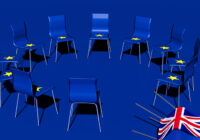As the hegemony of the nation-state deteriorates, a brave new world is being conceived.
As outcrops of nationalistic fervor and protectionism are exposed across Western Europe and the United States, it would seem that the tides of globalization are beginning to ebb. One only needs to glance at the headlines. The US and China are locked in a trade war. Britain votes to “take back control” from the EU. In Italy, a nationalist coalition has made immigrants and ethnic minorities the scapegoats of economic decline. Even Germany, the largest economy in the EU and a bastion of free movement and trade, is grappling with rising xenophobia.
On the other hand, if history has taught us anything about global politics, things are not always as simple as they seem.
In order to gain some perspective on the complex societies of today, it is perhaps helpful to return to a simpler time. This can be found in Ancient Greece, a civilization to which even the nation-state would have seemed a dystopic fantasy. Ancient Greece formed a collection of perpetually warring city states, the greatest of which were Athens and Sparta. Despite their simplicity of organization, these states also contain the prototypes of our modern political systems. Sparta was an oligarchy, led by a monarch, whereas Athens was the world’s first democracy, and a republic.
Nevertheless, there are some fundamental differences between the ancient conception of a state and our own. For a start, at the time, public life was far more important to a Greek than his private pursuits. In both democracy and oligarchy, citizens were expected to dedicate the majority of their time to the service of the state, attending government in person and participating in both civil and military campaigns. This degree of representation was only possible with a small number of citizens, whose everyday non-political needs where met by the slaves that made up the majority of the state’s population. It was inequality, therefore, that set the Ancient Greeks free to transcend petty self-interest and to pursue a higher purpose in relation to the state.
In the modern nation, for reasons of practical necessity as much as fairness, this structure has been replaced by universal suffrage and taxation, generally to the benefit of peace and prosperity. Nonetheless, as the Greek pagans would no doubt agree, man does not live on bread alone. Retaining some sense of a higher purpose of the state was critical: Without this spiritual cement, faith in the material systems would soon crumble, especially in times of hardship and war.
Nationalist Canon
Moral solipsism was the favored method. In England, King Henry VIII made the first decisive break from mainland Europe with the rejection of papal authority in 1534. The empire on which the sun never set would in turn foster a sense of cultural superiority that still haunts Britain today. Across the channel, the French Revolution absorbed the powers of both god and king into the authority of the state. Even in the proudly Christian US, secular pride reached mythological proportions in the so-called American Dream. Finally, festering in the wounds of World War I, this strain of exceptionalism revealed its dark and destructive conclusion in the birth of Nazi Germany.
For a period of time, however, the nationalist canon was effective. Citizens were able to view their private business in the light of a broader societal effort — small cogs in the great engine of the state. This was partly due to the financial security that the nation state could provide for its people. Free trade and market expansion were encouraged, and foreign competition was held at bay in key industries. As the Western nations were being fattened by the cream of international trade, money was poured back into developing infrastructure and providing public services. For the most part, capital was kept within borders. Citizenship in these states, if no longer a route to politics, could still offer its holders stability and a sense of belonging.
A technological revolution has since torn this system asunder. Near-instantaneous communication has triggered impetuous floods of data between nations: Information has become monetized and the continuous removal of capital controls has led to an explosion of unregulated currency markets, the scale of which far exceeds the resources available to any government. In essence, the nation state has lost its economic sovereignty, and countries have been left exposed to the thunder of the financial gods. The upshot has been an erosion of domestic political authority. As prices soar and wages fail to keep abreast of inflation, trust in government promises is repeatedly undermined. At the same time, some citizens seem to enjoy divine providence.
Modern Excellence
In his popular book, The Greek Way of Life, British classicist and philosopher Goldsworthy Lowes Dickinson tells us that the acceptance of inequalities in the ancient world was partly the result of the Greeks’ high conception of human excellence, “which it was the function of the citizen to realise in his own person, at the cost, if need be, of other members of the state.” For the Greeks, human excellence was conceived as a noble harmony of worldly indulgence and spiritual prowess, with the former kept in check by the latter, but neither deficient nor lacking.
“My question to you is, is this what you want? Is this how you want history to remember you? As the handmaidens to authoritarianism?”
Watch as @carolecadwalla calls out the “gods of Silicon Valley” for being on the wrong side of history: https://t.co/SrTKzCbPSV #TED2019 pic.twitter.com/ETaXSdgWUq
— TED Talks (@TEDTalks) April 16, 2019
The modern idea of excellence has changed, but in its new form it is regarded just as highly. Inequality is accepted as part and parcel of a capitalist state, while the worship of balance has given way to the worship of excess. To quote Texas oil tycoon H. L. Hunt, “Money is just a way of keeping score.” The real prize is power. The five largest tech companies are now collectively worth more than the entire economy of the United Kingdom, and this economic leverage is made manifest in an information empire far beyond the ambitions of any 18th-century colonizer.
Moreover, unlike their sovereign counterparts, the corporate “state” makes no pretense of democracy. In fact, it bears a striking resemblance to a Spartan oligarchy. The slave class has been replaced by two distinct groups: firstly, in a more literal sense, by scattered armies of laborers from the developing world, whose limited rights and willingness to work for extortionately low wages provide fast burning fuel for the corporate furnace; and secondly, and more figuratively, particularly in relation to free-to-access services like Facebook and Google, there is the consumer, or user. Theirs is a labor of leisure — a willing donation of clicks and personal data, monetized in the form of vast advertising revenues.
The Spartans themselves are reflected in the captains of industry, set free from the petty concerns of private business to concentrate the higher task of global expansion. As members of the elite begin to identify their purpose with that of the corporation, loyalty to their respective nations has also begun to wane — a paradigm shift mirrored by the aggressive transfer of domestic profit to offshore tax havens.
Meanwhile, at the other end of the spectrum, disenchantment with the nation-state has fed into the propaganda of borderless terrorist groups like the so-called Islamic State. Their promises of a shared identity and a common cause through jihad has led tens of thousands of alienated foreign nationals to abandon their countries and declare war on the West. The roots of this exodus are knotted and difficult to isolate, but the trend of the nation-state toward political nihilism is undoubtedly a factor.
Similar forces are at work in Iran’s recent threat to use foreign mercenaries against its own people — a clear demonstration of a regime’s willingness to defend its ideological supremacy against the interests of the country it governs.
Last Desperate Attempt
This brings us back to the parallel and seemingly contradictory rise of nationalism. One response would be to label it as merely symptomatic — a last desperate attempt to patch up a sinking ship. But perhaps it is more than that. Even as the financial structures of the world become increasingly complex, our democratic institutions have remained fairly unchanged.
They are also vulnerable. In a digital age of fake news and addiction to easy emotions, truth and reason — the bedrock of a healthy democracy — are steadily eroded. Simplistic narratives of “us against them” and pledges of a return to past glories could be seen as a form of escapism, encouraging citizens to drug themselves with patriotic visions of power and autonomy.
Karl Marx made a similar observation when he branded religion an “opiate of the masses.” According to his vision, the illusory happiness it gave people made them blind to real suffering and injustice. Whether or not Marx was correct about religion, nationalism seems to fulfill the same role today. By channeling the anger and despair of national decay toward the members of society that are least responsible, it deafens the population to more pressing issues like inequality. This in turn paves the way for corporate elites to seek ever greater immunity from the checks and balances of a diminished state.
As the hegemony of the nation-state deteriorates, a brave new world is being conceived. In many ways, however, the nascent system has retained a family resemblance to its predecessors. Citizenship, even in the most profound Grecian sense of the word, has not been eliminated but rather reimagined. It is no longer attained by birth, nor hemmed in by borders. Freed from the stifling conventions of state morality, the global citizen is a director of the blind and insatiable appetites of consumerism. She can be found among the Davos set of business leaders with a taste for politics and imperial designs. Armed with a Domesday Book of consumer data, their companies do not merely supply to demand — they manufacture demand as well, giving them an unprecedented control of market forces.
Sovereignty has been replaced by monopoly, and the new citizen is called upon to defend this monopoly even at the cost of one’s personal wealth, although preferably at the cost of its competitors. Of course, a business, unlike a state, is not a moral entity. Its highest duty is the satisfaction of its shareholders — the not-so-mere mortals whose present interests will soon play a defining role in our future: a global state in which national identity has been usurped by the imposed identity of the culturally androgynous customer, and political relevance is the preserve of an elite few.
This may all seem rather apocalyptic, and perhaps there is still time to turn back the clock. But the longer the voters spend dreaming of democracy past, the more probable it is that they will wake up to find that they no longer exist.
The views expressed in this article are the author’s own and do not necessarily reflect Fair Observer’s editorial policy
Support Fair Observer
We rely on your support for our independence, diversity and quality.
For more than 10 years, Fair Observer has been free, fair and independent. No billionaire owns us, no advertisers control us. We are a reader-supported nonprofit. Unlike many other publications, we keep our content free for readers regardless of where they live or whether they can afford to pay. We have no paywalls and no ads.
In the post-truth era of fake news, echo chambers and filter bubbles, we publish a plurality of perspectives from around the world. Anyone can publish with us, but everyone goes through a rigorous editorial process. So, you get fact-checked, well-reasoned content instead of noise.
We publish 2,500+ voices from 90+ countries. We also conduct education and training programs
on subjects ranging from digital media and journalism to writing and critical thinking. This
doesn’t come cheap. Servers, editors, trainers and web developers cost
money.
Please consider supporting us on a regular basis as a recurring donor or a
sustaining member.
Will you support FO’s journalism?
We rely on your support for our independence, diversity and quality.







